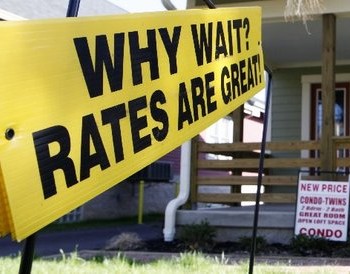 The real estate market continues to heat up. Historically low unemployment and interest rates coupled with shrinking housing supplies has caused home values to increase in many markets. In fact, according to the National Association of Realtors, national median existing home prices were up 6 percent from April of 2016, marking the 62nd month of consecutive price increases. Affordability is down, making purchasing a home more difficult, especially for those buying their first home.
The real estate market continues to heat up. Historically low unemployment and interest rates coupled with shrinking housing supplies has caused home values to increase in many markets. In fact, according to the National Association of Realtors, national median existing home prices were up 6 percent from April of 2016, marking the 62nd month of consecutive price increases. Affordability is down, making purchasing a home more difficult, especially for those buying their first home.
While the percentage of millennials purchasing a home may have declined in the past, new statistics from NAR note that first-time home buyers make up approximately 35 percent of overall sales. As one of the largest investments most people will make, consider reviewing the 7 strategies noted below.
Choosing the right price point
Determining how much house you can afford is one of the most important decisions a first-time home buyer can make. How much is too much? Too often buyers end up purchasing more home than they can afford and end up with excessive mortgage debt. Remember, just because a mortgage company will lend you the money doesn’t mean that you can actually afford to pay it back. Banks may approve you for a mortgage payment that leaves little to no additional discretionary income. Rather than taking a house-poor approach, consider establishing a financial game-plan that leaves you with a sufficient financial cushion for all of your annual expenses – including savings. Remember, any home purchase that prevents you from saving for your future may be too expensive.
Factor in miscellaneous expenses
The transition from renting to owning can cause some first-time buyers to forget about expenses they do not have experience paying. (This is especially true for those who were previously living at home). Real estate taxes, homeowners’ associations (HOA) fees, utilities and on-going maintenance of the property can add considerable cost over time. Consider completing a detailed budget to ensure that you will continue have income to save for other goals such as retirement after closing on your new home. Keep in mind, the home is often the cheap part of the transaction. Run your own numbers, taking into consideration renovations, furnishings and the potential for increases in real estate taxes over time to see what you truly can afford.
Selecting your down payment amount
Determining how much to put down on a home is also challenging. How much do you need to put down to be approved? Is it possible to make a 20 percent down payment to avoid PMI insurance? There are many factors to consider. For many first-time home buyers, coming up with a 20 percent down payment may simply be unrealistic. Private Mortgage insurance (PMI) is a policy provided by private insurers to protect a lender against loss if a borrower defaults. Since smaller down payments mean larger risk for lenders, the need for PMI will increase your borrowing costs. Putting down less also increases risk for the home buyers too. For example, if you only put down 5 percent on your purchase and the home depreciates by 10 percent due to a down-turn in the real estate market, your home would then be “upside down”. (you owe more on the mortgage than your home is worth.) Down payments insulate both the lender and the borrower from fluctuations in the real estate market so choose wisely. Additionally, some lenders offer creative alternatives to PMI. According to John Kussmaul, a Mortgage Loan Officer with TD Bank serving the east coast, “Many first-time buyers or young couples do not have the funds to make a 20% down payment. We offer a split mortgage where we can do an 80% first mortgage and then a line of credit for the difference up to a max financing of 90 percent. In this scenario, there is no mortgage insurance.”
It is also critical to maintain plenty of cash reserves after making your down payment. Spending the majority of your cash reserves for a down payment can leave you susceptible to incurring other forms of debt if a financial emergency arises.
Choosing the right mortgage
Fixed rates, adjustable rates, conventional, Federal Housing Administration (FHA) loans, Veterans Affairs loans (VA), jumbo – there are many varieties and it is critical to do your research and work with a reputable mortgage company you can trust. Fixed rate loans offer principal and interest payments that will not change during the life of the loan. (Your payment only increases if you choose to pay your real estate taxes or home owners insurance with your mortgage payment and they increase.) For example, a 30-year fixed rate mortgage will lock in the interest rate for the duration of the loan. On the other hand, adjustable loan rates will change at some point during the loan. For example, a 5/1 ARM will have a fixed rate for the first five years, transitioning to a rate that adjusts annually thereafter. While fixed rates often carry slightly higher interest rates, locking in low, fixed interest rates for the long-term may be beneficial for buyers – especially if they plan to remain in the home for the long-term and interest rates increase over time.
Also, be sure to shop around and consider various lenders. Mortgage rates can vary drastically between lenders - as much as 0.75 percent of the loan. Closing costs, which run between 2 and 5 percent of the loan amount also add up, pushing the mortgage annual percentage rate even higher. Consider visiting online resources such as www.Zillow.com or www.Bankrate.com to assess your options. Comparison shop and consider utilizing online mortgage and affordability calculators at the sites noted above as they too, can help you get a better handle on how the variation in rates can impact your monthly payment and cash flow.
Don’t get emotional
Falling in love with a property can cause some buyers to make foolish mistakes such as overpaying or overlooking major repair costs. Do your best to avoid making your first-time home purchase an emotional decision. Instead, do your best to recognize that your home is an investment. While housing supplies are tighter and statistics suggest that the average home is only on the market for 29 days, there are usually other opportunities available if you miss the first home you like so keep your emotions in-check. This is especially important as many first-time buyers can be outbid by “all cash” offers. Bottom line – letting the purchase become emotional will most likely cost you more in the long-run.
Obtain your mortgage preapproval prior to shopping
Knowing your numbers and obtaining a pre-approval prior to shopping can help prevent you from falling in love with a home you may not even be able to afford. After vetting multiple mortgage companies and choosing whom you are most comfortable with, find out how much you can be pre-approved for. Keep in mind, there is a difference between preapproved and prequalified. Prequalification is quick and based only on estimates of your credit score and financials. In contrast, a mortgage application based on actual data is necessary for preapproval and is preferred by most sellers as it more indicative of the buyer being able to close the deal and obtain the mortgage. Also, be sure not to show all your cards by letting the sellers know the maximum amount you are preapproved for. Instead, consider presenting a preapproval letter for the exact amount of your offer.
Obtain a quality home inspection
A home inspection is a critical step in the home-buying process as it may identify issues and help prevent purchasing someone else's repair problems. Unfortunately, many homebuyers cut corners and end up with a substandard inspection. First, be sure not to choose an inspector based solely upon lowest cost or a recommendation from your agent. Certainly, speak to anyone referred, but also consider seeking out multiple inspectors to assess the thoroughness of their process. Next, make sure that all buyers attend the inspection. It is a great opportunity to learn the ins and outs of the property you are purchasing. While an inspection is essential, even for new construction, it is important to remember that the inspection process will not necessarily uncover all issues that may be present.
From determining your maximum purchase price to evaluating mortgage financing options, there are many factors to consider when purchasing a first-home. Obtaining mortgage pre-approvals prior to shopping and working with quality home inspectors are also a must. Since everyone’s situation is unique, consider speaking to your financial adviser, mortgage consultant and realtor to determine the most appropriate game-plan for your first home purchase.









